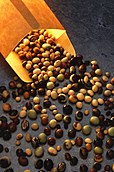The soybean (U.S.) or soya bean (UK) (Glycine max) is a species of legume native to East Asia, widely grown for its edible bean which has numerous uses. The plant is classed as an oilseed rather than a pulse by the Food and Agricultural Organisation (FAO).
Fat-free (defatted) soybean meal is a primary, low-cost source of protein for animal feeds and most prepackaged meals; soy vegetable oil is another product of processing the soybean crop. For example, soybean products such as textured vegetable protein (TVP) are ingredients in many meat and dairy analogues. Soybeans produce significantly more protein per acre than most other uses of land.
Traditional nonfermented food uses of soybeans include soy milk, and from the latter tofu and tofu skin. Fermented foods include soy sauce, fermented bean paste, natto, and tempeh, among others. The oil is used in many industrial applications. The main producers of soy are the United States (35%), Brazil (27%), Argentina (19%), China (6%) and India (4%). The beans contain significant amounts of phytic acid, alpha-linolenic acid, and the isoflavones genistein and daidzein.
Soy varies in growth and habit. The height of the plant varies from below 20 cm (7.9 in) up to 2 metres (6.6 ft). The pods, stems, and leaves are covered with fine brown or gray hairs. The leaves are trifoliolate, having three to four leaflets per leaf, and the leaflets are 6–15 cm (2.4–5.9 in) long and 2–7 cm (0.79–2.76 in) broad. The leaves fall before the seeds are mature. The inconspicuous, self-fertile flowers are borne in the axil of the leaf and are white, pink or purple. The fruit is a hairy pod that grows in clusters of three to five, each pod is 3–8 cm long (1–3 in) and usually contains two to four (rarely more) seeds 5–11 mm in diameter. (Full article...)
